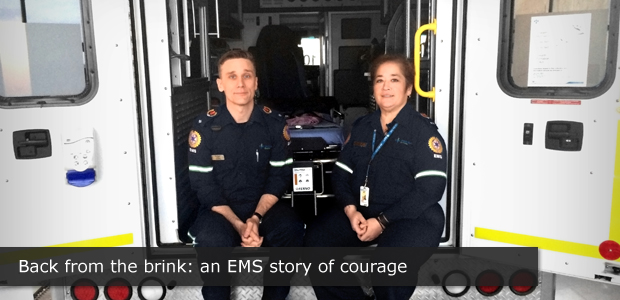Back from the brink: an EMS story of courage

All I ever wanted to do was work for Emergency Medical Services (EMS); as an emergency responder I felt important, I felt needed, more importantly, I had a purpose.
However, over the years, certain calls began to slowly get to me. I’ll never forget the three-year old girl who we transported, but lost; afterwards, I sat on the bumper of the ambulance, broken.
I moved from working on the road to taking calls as a dispatcher, but I was less in control. I had to rely on someone taking instruction from me to treat the patient. Answering the phone to hear about hangings, stabbings and assaults started to wear on me. Sometimes I felt like I was in a different world.
Depression rolled into my life like a black cloud, and after 21 years of service, a storm I felt I could no longer avoid rained down on me.
I was alone, really alone. I felt like my time was done and that I was not needed anymore. My self-worth took a beating and I was the assailant. I gave in to medication treatment that dulled my senses and made me say and do things very out of character for me. As a devout Christian, my faith seemed so far away, tucked somewhere among the black clouds.
On my way to a night shift, I received a call from my managers. They were concerned for my wellbeing, they said. They requested that I not come to work. I was devastated, I needed to work, I needed to be where I was needed and in control. There was no negotiating; I was not to come to work.
I was furious with rage and went for a drive. I had pulled over to call Ben Penner, a peer support guy who I’d talked to several times before. He tried to convince me to go to the hospital — but my pride got in the way and there was no way I was going to present to the hospital in full uniform. Not knowing that there was already a missing persons report filed by my family, I agreed to call Ben back in 15 minutes.
I took two of my anti-anxiety medications to try to get my heart rate down and continued driving. I found an empty parking lot and took an entire bag of my prescription medications. My phone rang, and I agreed to let Ben come get me. That's the last thing I remember as I set the phone down.
After a lengthy hospital stay, I started to move forward. The storm had passed and in its wake was a broken, scared, shell of a person. There was still darkness, but it was calm. I had to rebuild.
I continue to talk to Ben, and engage with EMS’ mental health resources. My managers and colleagues are supporting me as I reconstruct my life. My medications have changed, I find joy in things outside EMS, and I feel blessed to be alive.
Today, I tell my story. Not for attention, and not for admiration or sympathy. If I have to live with the shame and embarrassment of what I have done, then there needs to be some sort of good come of it. I hurt my coworkers, my friends, and most of all, my family.
If I can lessen the effects of someone else's storm, then something good will come from the night of the storm I weathered.
If someone reaches out before their storm has a chance to cause havoc, then the shame and guilt of my night can be tolerated; I can start taking the boards off the windows and start sweeping up the debris.
Related Feature Story: 'I derailed that night' - Thankful her suicide bid failed, EMS member shares her courageous journey back to mental health (May 26, 2016)
Support available 24/7
EMS provides a Critical Incident Stress Management (CISM) and Peer Support Program. Volunteer EMS staff offer peer-to-peer support and debriefing to emergency responders. Support is available around the clock at 1-855-512-4127.










